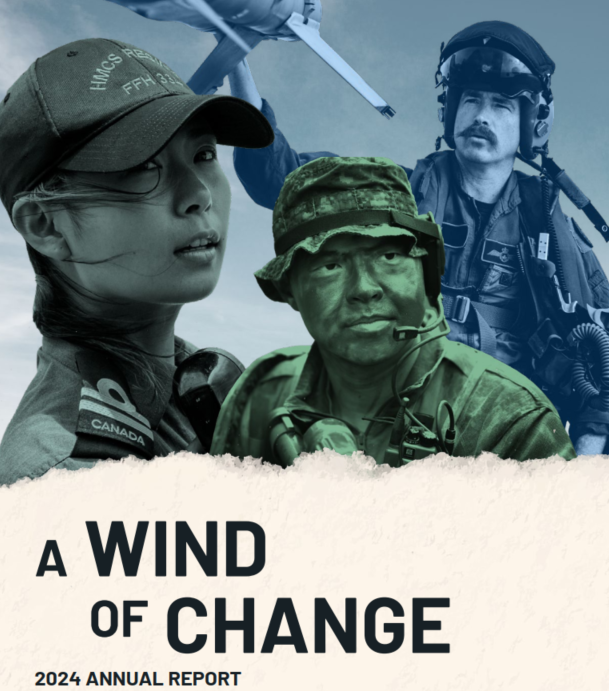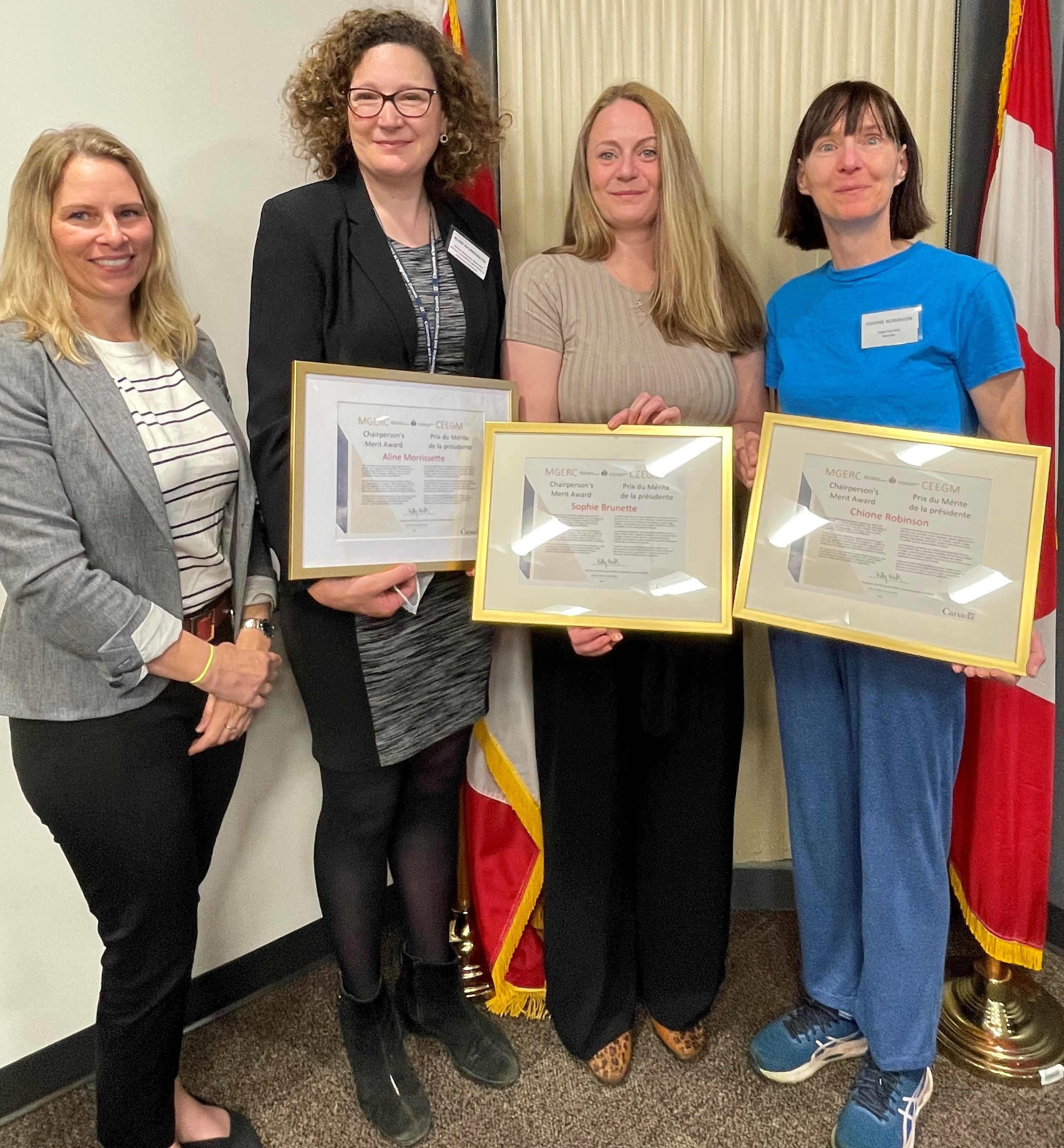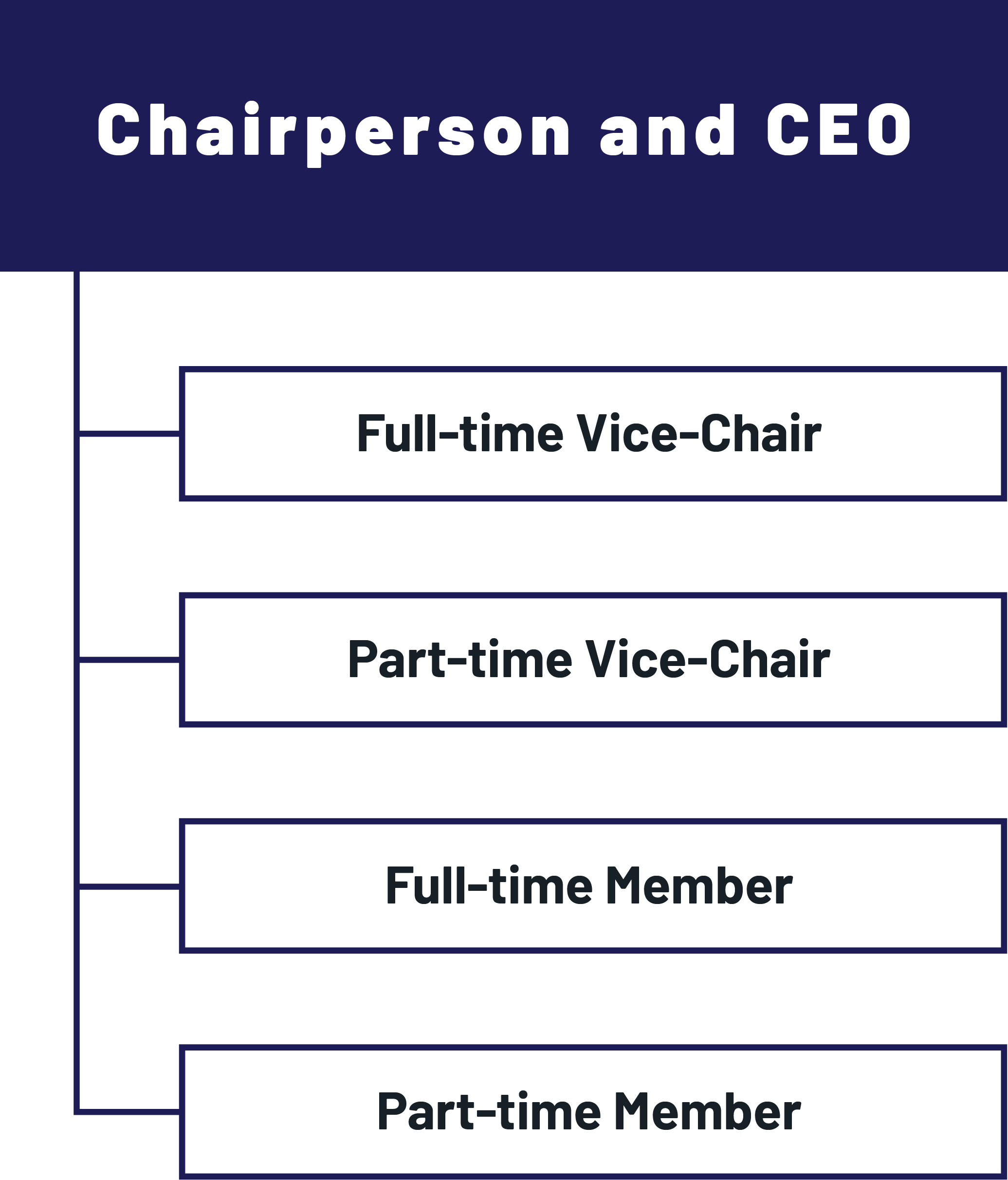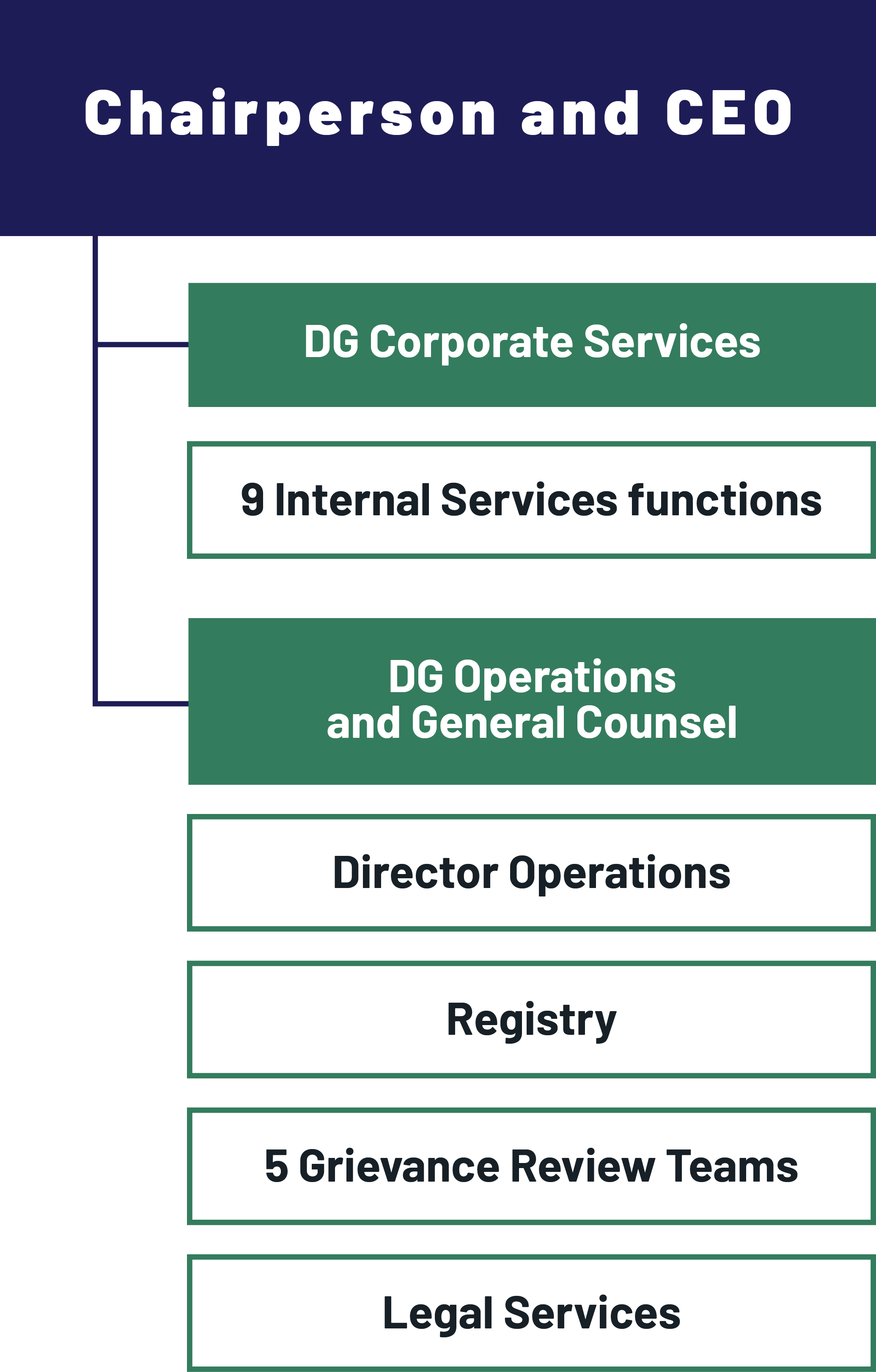2024 Annual Report: A Wind of Change
© His Majesty the King in Right of Canada, represented by the Minister of National Defence, 2025.
Cat. No. DG1-1E-PDF
ISSN 2368-9986

Annual Report 2024
A wind of change
Table of contents
Message from the Chairperson and Chief Executive Officer

Kelly Walsh
Chairperson and Chief Executive Officer
I am pleased to present the 2024 Annual Report of the Military Grievances External Review Committee (Committee). This is my first Annual Report as Chairperson, having joined the Committee in the spring of 2024.
First, I would like to take a moment to extend my sincerest thanks to Vihar Joshi for stepping up as Interim Chairperson for close to two years, including the first four months of 2024. Mr. Joshi’s leadership and vision can only be described as steady, strategic and sage. Coming into a resilient organization that is well-positioned to not only succeed but excel is an advantage I owe to Mr. Joshi.
The Committee’s mandate remains paramount: pursuant to section 29 of the National Defence Act (NDA), the Committee reviews military grievances referred to it and provides findings and recommendations (F&R) to the Chief of the Defence Staff (CDS) and the Canadian Armed Forces (CAF) member who submitted the grievance. We fulfill this mandate through our independent review and our thorough analysis.
2024 was the beginning of our transformation journey at the Committee. With the arrival of the Vice-Chairperson and myself, we took time to observe, understand, and analyze the Committee’s processes, ensuring we had a clear picture of the organization’s strengths and areas of improvement. We then embarked on a journey of renewal, focusing on increasing productivity, improving service delivery, and fostering a modern and agile organization.
A key priority this year was laying the groundwork for future achievements. We prioritized staffing our Operations team, ensuring they were fully equipped with the skills and knowledge to excel. This commitment is reflected in the issuance of 208 F&R reports in 2024, demonstrating our unwavering dedication to timely and thorough investigations. To further modernize our operations, we initiated a review of the grievance review process, exploring opportunities to streamline the process and improve efficiency, including the consideration of alternative approaches to reviewing grievances.
Building strong relationships with stakeholders has been a priority for me. Senior management actively engaged with key players within the CAF grievance system, including a meeting with the new CDS. These efforts will position us to ensure our value added is well understood and instills confidence in the CAF grievance system, and most importantly, contributes to its overall fairness.
In 2024, Corporate Services prioritized fostering a positive and inclusive work environment. We championed public service values through employee discussions and developed a three-year Values and Ethics Plan. We also advanced initiatives on reconciliation and in response to the Call to Action on Anti-Racism, Equity, and Inclusion in the Federal Public Service. To enhance employee well-being during a time of change and new senior management, we focused on keeping employees informed through insightful blog posts. These efforts reflect our dedication to fostering a supportive and engaging work environment where our employees feel empowered to embrace change.
Finally, we updated our vision statement to reflect the evolving needs of the Committee and the CAF grievance system. This new vision underscores our commitment to continuous improvement, exploring innovative approaches to reviewing grievances, and ensuring a fair and effective process.
We concluded 2024 with a renewed sense of purpose and a strong foundation for the future. I am incredibly fortunate to work with this exceptional team. Their dedication, hard work, and innovative spirit have enriched my own understanding and deepened my commitment to our shared mission.
Kelly Walsh
Chairperson and Chief Executive Officer
2024 at a glance
The program: Independent review of military grievances
For the Operations team, 2024 marked the beginning of a new chapter. With the arrival of a new Chairperson and Vice-Chairperson in the spring, the Committee embarked on a journey of renewal, focusing on streamlining its grievance review process and identifying other optimizations to achieve a reduction in the overall time it takes to review a grievance. A key focus this year was to continue augmenting the capacity of the Operations team. The Committee deployed important efforts in staffing and preparing to welcome new employees to the Committee by providing them with the necessary skills and knowledge to excel in their roles. Despite these considerable investments, the Committee maintained a strong operational focus. In 2024, the Committee received 341 grievance referrals and issued 208 F&R reports, demonstrating its commitment to delivering thorough analysis and F&R reports to the CDS and the grievor who submitted the grievance.
The Committee also made substantial progress in modernizing and streamlining its operations. It successfully completed a major update to the case management system, enhancing its userfriendliness. Comprehensive training sessions were provided to ensure all staff were proficient in using the new system. After initiating an analysis of the grievance review process, the Committee is exploring alternative review strategies for greater expediency and flexibility.
Building strong relationships with stakeholders remained a priority. The Committee’s senior management engaged in regular meetings throughout 2024 with key stakeholders within the CAF grievance system. Additionally, the Committee regularly engaged with the Canadian Forces Grievance Authority personnel to ensure that the CAF grievance system is operating as efficiently and as effectively as possible.
Throughout 2024, 88% of grievor survey responses revealed that it was essential that their grievance be reviewed by an independent body prior to a decision being made by the Final Authority (FA). This underscores the crucial role that the Committee plays in the CAF grievance system. Additionally, according to survey responses, 57% of grievors felt that the review of their grievance was completed in a reasonable amount of time. The Committee understands the importance of timely grievance reviews and that is why it is actively working on changes to ensure a more efficient completion of F&R reports.
The changes launched this year will enable it to strengthen confidence in and add to the fairness of the CAF grievance process.
How many grievances did the Committee receive and how many F&R reports did the Committee complete?
| 2022 | 2023 | 2024 | |
|---|---|---|---|
| Grievances received from the CAF | 345 | 168 | 341 |
| F&R reports delivered to the CAF and grievor | 142 | 215 | 208 |
| FA decisions received in response to issued F&R reports | 261 | 63 | 167 |
Note: In 2023, COVID-19 related F&R reports comprised 24% (52) of the Committee’s completed reports, while in 2024, they constituted 29% (61).
How many active grievances did the Committee have in its portfolio at the end of the year and how many were awaiting an FA decision?
| 2022 | 2023 | 2024 | |
|---|---|---|---|
| Active grievances awaiting an F&R report from the Committee | 374 | 315 | 445 |
| Grievances awaiting an FA decision after the F&R has been issued | 279 | 439 | 455 |
What is the average number of months to review a grievance at the Committee?
| 2022 | 2023 | 2024 | |
|---|---|---|---|
| From the date assigned to a team to the date the F&R report was delivered to the CAF | 5.35 | 9.72 | 8.97 |
| From the date received at the Committee to the date the F&R report was delivered to the CAF | 10.56 | 16.29 | 18.23 |
What category of grievances referrals did the Committee receive?
| 2022 | 2023 | 2024 | |
|---|---|---|---|
| Careers | 65% | 50% | 23% |
| Harassment | 6% | 9% | 11% |
| Medical and dental care | 2% | 2% | 4% |
| Others | 3% | 2% | 1% |
| Pay and benefits | 23% | 33% | 54% |
| Releases | 2% | 3% | 7% |
Note: Totals may not add to 100% due to rounding.
How many mandatory and discretionary grievance referrals did the Committee receive?
| 2020 | 2021 | 2022 | 2023 | 2024 | |
|---|---|---|---|---|---|
| Mandatory referrals | 141 (62%) | 189 (58%) | 273 (79%) | 157 (93.5%) | 334 (98%) |
| Discretionary referrals | 85 (38%) | 138 (42%) | 72 (21%) | 11 (6.5%) | 7 (2%) |
Note: Totals may not add to 100% due to rounding.
Systemic issues and Observations raised by the Committee
Lack of Procedure for Posting Avoidance
The Committee has observed the lack of procedural fairness in the posting avoidance Administrative Review process.
The process described in section 4.7 of Defence Administrative Orders and Directive 5019-2 applies to any decision affecting a member’s rights, interests or privileges. A CAF member should be afforded procedural fairness when the CAF is contemplating a compulsory release. An imposed early release for posting avoidance significantly affects the CAF member’s interests. The CAF must stop skirting due process when calling into question the viability of a member’s continued service.
The Committee recommended that the FA direct the appropriate authorities to undertake a review of the applicable policy, and to create a comprehensive procedure for decisions around posting avoidance. This will afford members with the basic procedural fairness that is required in such cases.
Revision of Loss of Operational Allowances Instructions
The Allowance — Loss of Operational Allowances (ALOA) benefit was designed to assist those CAF members who are put in harm’s way on special duty service and, because of that service, suffer an illness or injury. However, Compensation and Benefit Instructions (CBI) 205.536 make a distinction regarding the status of the member at the time of injury, as opposed to focusing on the cause of the injury. Specifically, members are not entitled to ALOA if the injury just happened to occur while the member was conducting physical fitness training despite what caused the injury, which is not in alignment with the intent of the allowance.
The Committee recommended that the CAF seek that the wording of CBI 205.536 be revised to ensure that the application of the policy and entitlement to ALOA are not unfairly restrictive.
Administration of Meal Expenses
The Canadian Armed Forces Relocation Directive (CAFRD) does not provide any discretion or flexibility for the CAF to adequately compensate members who are unable to take possession of their household goods and effects (HG&E), through no fault of their own, within the timelines established in the CAFRD. The 30-day cut off for meal allowances is an arbitrary time limit that does not consider situations in which additional delays occur completely outside of a member’s control. Mechanisms should be implemented to assist CAF members in this aspect of relocation so that they are not financially penalized.
The Committee recommended that the CAF engage with the Treasury Board Secretariat to propose changes to the CAFRD to cover the meal expenses for members until their HG&E arrives, regardless of the type of move or time elapsed waiting for HG&E.
Amendments to Maternity and Parental Allowances
Changes to the Employment Insurance Act occurred in December 2017, allowing Canadians to elect “standard” Employment Insurance (EI) parental benefits of 55% of their normal earnings for 35 weeks, or “extended” EI parental benefits of 33% for 61 weeks. At the time, the CAF provided a top-up parental benefit to 93% of a member’s salary under the CBI 205.261, Maternity and Parental Allowance, for up to 35 weeks no matter what EI parental benefits option the member chose.
In 2021, the Treasury Board approved amendments to CBI 205.261 with an intended effective date of 13 May 2021, offering members top-up to 93% for those electing standard EI parental benefits, and top-up to 55.6% for those electing extended EI parental benefits. However, the amended CBI was not published to the Defense Wide Area Network (DWAN) until 11 June 2021 and was not announced to CAF members until Canadian Forces General message 101/21, CHANGES TO CBI CHAPTERS 204 AND 205 was issued on 24 June 2021. Additionally, the Director Pay Policy and Development did not provide updated guidance to pay administrators until 7 July 2021 and administrators were unable to correctly administer the benefit in pay processing software until September 2021. Approximately 15 grievances have come before the Committee where grievors began their period of parental leave after having expected to collect extended EI parental benefits and top-up to 93% only to later have their top-up reduced to 55.6% and be subject to recovery of overpaid benefits.
The Committee found that the delayed publication of the amended CBI 205.261 made the effective date retroactive, and therefore in violation of general principles of the rule of law prohibiting retroactive legislation. The Committee found that, in accordance with the Queen’s Regulations and Orders for the Canadian Forces article 1.21, the amended CBI did not become effective until issued by the CDS through publishing the amended version to DWAN. For those grievors who began their leave before 11 June 2021, the Committee found that they had a vested right to the previous 93% top-up rate. For those who did not have a vested right, the Committee found that the implementation of the amended benefit was maladministered by the CAF, resulting in real harm occurring to the grievors. The Committee recommended that these grievors should have been considered for remission of their debt, but considering that the debts had already been repaid, recommended that their claims be referred to the Director Claims and Civil Litigation to address negligent misrepresentation. Additionally, through a systemic recommendation, the Committee also recommended that overpayments should proactively be considered for remission before recovery action commences.
Recovery of Overpayment
Several cases have been reported in which the CAF provided incorrect information to a member regarding their eligibility for financial benefits and attempted to place the responsibility on the individual member. Even though overpayments must be recovered, these errors should not be minimized because they can have significant negative consequences on the members and compel them to file grievances, which inevitably generates additional costs for the government. The Committee pointed out to the CAF that the Guide to Debt Deletion explains that each situation must be assessed on its merits. Unless and until the CAF holds accountable those responsible for the errors and continues to download responsibility to the grievors, no change will occur.
The Initial Authority Denying Late Grievances
The Committee receives many grievances in which the Initial Authorities (IA) deny grievances on the grounds of having been submitted beyond the three-month time limit that begins on the date of reasonable discovery of the decision, act or omission that the grievance addresses, as prescribed in the Queen’s Regulations and Orders for the Canadian Forces article 7.06. IAs either find that it is not in the interest of justice to accept the grievance or do not analyze this aspect. However, the FA routinely accepts these grievances as being in the interest of justice, even if the reasonable date of discovery was years, even decades, before the grievance was submitted.
The Committee notes that the IA rejection of grievances is out of step with the FA acceptance of the same circumstances as being in the interest of justice. Rejection of grievances at the IA level unjustly denies the grievors an opportunity to have their grievances resolved in an expedited manner at the lowest level. It also precludes investigation of the grievance by IAs who have ready access to the information required, burdening both the Committee and FA who must spend time gathering this information and thus slowing the grievance process. The Committee recommended that the FA direct IAs to apply the same rules as the FA and accept grievances submitted beyond time limits in the interest of justice.
Situational Assessment
The Committee has reviewed several files where the policy on Situational Assessment (SA) was misinterpreted. Errors at this step of the process have significant consequences for members who submit harassment complaints because it means they must spend a lot of time and effort to have their allegations heard. Often, redress is afforded many years later. This passage of time creates obstacles to effective and meaningful resolution and undermines confidence in the policy.
In light of this, the Committee recommended that consideration be given to reviewing the SA policy with a view towards clarifying or simplifying the process. Further, a consideration should be given to including a mandatory consultation with the Chief Professional Conduct and Culture prior to the finalization of SAs to ensure compliance with policy at the earliest point in the process.
grievances received in 2024
Findings and Recommendations reports issued in 2024
Parliamentary questions completed in 2024
Workforce for 2024:
- 46 full-time equivalents
- 5 Committee Members
Expenditures
- $6,444,510 for salaries, wages and other operating costs
- $901,864 for contributions to employee benefit plans
- $1,213,284 for other operating expenses
- Total expenditures: $8,559,658
Corporate Services Achievements
As stewards of the public trust, Corporate Services must embody public service values and ethics in all their actions. They must lead by example as they work to cultivate a healthy, safe, and respectful workplace, create an organizational culture that promotes innovation and excellence, take action to deliver results for their clients and shape the public service of the future.
Cultivating a Values-Based Culture
In 2024, senior management led discussions with employees to explore public service values and ethics within the context of the current work environment. These discussions encouraged open dialogue and provided an opportunity for employees to share their insights and propose concrete actions to enhance ethical conduct within the public service. Building on these discussions, a threeyear Values and Ethics Plan was approved and communicated to all employees. Additionally, the Committee completed an initial review of its Code of Conduct and will be focusing on employee learning through training, guidance, and internal communications.
Advancing Reconciliation, Anti-Racism, Equity, Inclusion and Accessibility in the Public Service
The Committee has set goals to foster greater inclusion by advancing reconciliation, accessibility, equity and well-being in the workplace. The Committee has reinforced cultural sensitivity and Indigenous reconciliation considerations in the integrated Human Resources Plan and Mental Health Action Plan. Aside from specific mandatory training and internal events/ sessions, the Committee has endorsed recruitment campaigns to attract a diverse workforce and is committed to establishing a sponsorship program. Senior management has endorsed the Champions and Safe Space Ambassadors’ roles at the Committee to create safe spaces for employees’ voices to be heard. This encompasses promoting wellness, diversity, and inclusion within the workplace. The Committee achieved this by organizing activities and sharing resources to empower employees and managers in maintaining worklife balance and fostering a positive and supportive work environment. For example, the Committee organized an engaging “Blanket Exercise” activity to commemorate National Day for Truth and Reconciliation, to further advance reconciliation and a more inclusive and respectful workplace. Additionally, the Committee updated its Canada.ca webpages to meet accessibility standards.
Equipping Employees to Deliver
Notable progress was achieved in providing employees with the tools and resources necessary to perform their roles effectively. The Committee prioritized employee development by implementing training initiatives focused on building digital competencies and boosting operational competence. It continued work on the modernization of the IT infrastructure through the ongoing cloud migration project. Also, the Committee modernized timesheets and other forms which resulted in optimized processes.
Continuing the Implementation of the Hybrid Work Model
In 2024, significant progress was made in implementing the Committee’s hybrid work model. Key accomplishments include a smooth transition to working three days in the office and meeting the prescribed presence in the office targets throughout 2024. The Committee continued the ongoing planning for the 2029 collocation project in collaboration with Public Services and Procurement Canada. Furthermore, the Committee’s new Business Continuity Plan was finalized and implemented following its formal approval and security information sessions were provided to all employees. In conjunction with this, the Committee implemented an employee notification system (GCNotify) to simplify communications with employees.
This tool provides timely notifications to employees during an emergency situation and also provides updates on system outages. These advancements demonstrate the Committee’s commitment to creating a flexible and modern work environment that supports employee well-being and enhances operational effectiveness.
Fostering Wellness and Engagement in the Workplace
Supporting the mental health and wellbeing of employees remains a priority for senior management. In 2024, the Committee conducted an employee wellbeing survey and developed an action plan to address identified needs. It also provided valuable resources including an Employee Assistance Program information session and ensured to promote mental health awareness through initiatives like Mental Health Week observances.
The Committee enhanced internal communications and engagement by improving the functionality and accessibility of its intranet site, ensuring it is a valuable resource for employees. It shared monthly blog posts from the Committee Champions, HR 101 blogs and promoted numerous events and resources. The Committee added helpful resources such as the “HR Communiqués” search tool and a values and ethics page on its intranet page. The Committee also introduced informal discussion groups to provide employees with a safe space to practice their second official language, and a book club was established with a similar purpose.
The Awards and Recognition Program at the Committee encourages excellence, initiative and personal commitment. While the Committee is fortunate to have a particularly dedicated and passionate group of employees, recognition continues to be of importance to employee satisfaction and organizational productivity. In 2024, the Committee celebrated National Public Service Week with a team building activity, as well as an afternoon at Britannia Park for all its employees in recognition of their work throughout the year.

Committee’s Champions — Recipients of the Chairperson’s Award

Chione Robinson, Aline Morrissette, Sophie Brunette and Mélissa St-Amand were the 2024 recipients of the Chairperson’s Award for their role as the Committee’s Champions. The Committee, as an organization and a team of people, benefits from their passion for official languages, well-being, future of work, accessibility, diversity, inclusion and Gender-Based Analysis Plus. The four Champions regularly go above and beyond their substantive job descriptions. They bring back a wealth of ideas and suggestions that fuel their monthly blog posts and their vision for special events. They advise and guide Human Resources in the development and implementation of activities. The Committee is very fortunate to have these Champions, who are dedicated to enriching and enhancing the mental health and wellbeing of employees and to advancing diversity, inclusion and accessibility within the organization.
About the Committee
Mandate
The Committee is an independent administrative tribunal reporting to Parliament through the Minister of National Defence. It reviews all military grievances referred to it by the CDS, as provided for in the NDA and article 7.21 of the Queen’s Regulations and Orders for the Canadian Forces.
Section 29 of the NDA provides a statutory right for an officer or a noncommissioned member to grieve a decision, an act or an omission in the administration of the affairs of the CAF. The importance of this broad right cannot be overestimated since it is, with certain narrow exceptions, the only formal complaint process available to CAF members.
Since beginning operations in 2000, the Committee has acted as the external and independent component of the CAF grievance process. It also has the statutory obligation to deal with all matters as informally and expeditiously as the circumstances permit.
Following its review of referred military grievances, the Committee provides its F&R reports to the CDS and the grievor. The CDS is the final decision-maker and is not bound by the Committee’s F&Rs. In any case where the Committee’s F&Rs are not accepted, the CDS must provide the reasoning in writing.
Types of grievances referred to the Committee
- Mandatory referrals are grievances relating to one or more of the following matters:
- administrative action resulting in the forfeiture of or deductions from pay and allowances, reversion to a lower rank or release from the Canadian Forces;
- the application or interpretation of Canadian Forces policies relating to the expression of personal opinions, political activities, candidature for office, civil employment, conflict of interest and post-employment compliance measures, harassment or racist conduct;
- pay, allowances and other financial benefits;
- the entitlement to medical care or dental treatment; and
- any decision, act or omission of the CDS in respect of a particular officer or non-commissioned member.
See article 7.21 of the Queen’s Regulations and Orders for the Canadian Forces that sets out the types of grievances that must be referred to the Committee once they reach the FA level.
- Discretionary referrals: the CDS has the discretion to refer any other grievance to the Committee.
Structure
The Committee consists of Committee Members appointed by the Governor in Council (GIC), who are responsible for reviewing grievances and issuing F&R reports.
Under the NDA, the GIC must appoint a full-time Chairperson and at least two Vice-Chairpersons. In addition, the GIC can appoint any other Committee Members that the Committee may require to carry out its functions. Appointments are for up to four years and can be renewed.
Information about GIC appointments can be found at Governor in Council appointments – Canada.ca.
Committee members
The Committee Members work with the support of the Registry Office staff, legal advisors, team leaders and grievance officers who provide analysis and advice on a wide range of issues. The Committee’s Corporate Services team offer the following services: management and oversight, communications, human resources management, financial management, information management, real property management, material management and acquisition management.


Grievance Process
Canadian Armed Forces grievance process
The CAF grievance process consists of two levels and begins with the grievor’s commanding officer (CO).
Level I: Review by the Initial Authority (IA)
Step 1: The grievor submits a grievance in writing to their CO.
Step 2: The CO acts as the IA if they can grant the redress sought. Otherwise, the Canadian Forces Grievance Authority assigns an appropriate IA. Should the grievance relate to a personal action or decision of an officer who would otherwise be the IA, the grievance is forwarded directly to the next superior officer who is able to act as IA.
Step 3: The IA renders a decision and, if the grievor is satisfied, the grievance process ends.
Level II: Review by the Final Authority (FA)
A grievor, who is dissatisfied with the IA’s decision, is entitled to have their grievance reviewed by the FA, which is the CDS or their delegate.
Step 1: The grievor submits their grievance to the CDS (or their delegate) for FA-level consideration and determination.
Step 2: Depending on the subject matter of the grievance, the CDS may be obligated to, or may at their discretion, refer it to the Committee. If the grievance is referred for consideration, the Committee conducts a review and provides its F&R report to the CDS and the grievor. Ultimately, the FA makes the final decision on the grievance.
Committee grievance process
The Committee’s internal review process consists of three steps: grievance reception, review and the drafting of F&R reports.
1. Grievance reception
Upon receipt of a grievance, the grievor is contacted and invited to submit additional comments or other documents relevant to their case.
2. Review
The assigned Committee Member holds a case conference where the grievance is reviewed and the issues are identified and discussed. The Committee Member works with a team leader, a grievance officer and legal counsel. If necessary, additional documentation is obtained and added to the file, and subsequently disclosed to the grievor. Although rare, it is possible a hearing may be held.
3. Findings and Recommendations
The Committee Member issues a F&R report, which is then sent simultaneously to both the CDS and the grievor. At this point, the Committee no longer has jurisdiction over the grievance. The grievor receives a decision directly from the FA.
Committee Members
Kelly Walsh

Ms. Walsh was appointed to the role of Chairperson and Chief Executive Officer of the Committee in May 2024 for a four-year term.
Ms. Walsh is an executive leader with a distinguished career spanning over 25 years in the public service. Her expertise traverses various domains including human resources, labour relations, corporate services and policy.
With a robust background in military grievances, Ms. Walsh held pivotal roles from analyst to director, contributing significantly to the development and refinement of the Canadian Forces Grievance System. Her contributions during the formative years of the Canadian Forces Grievance Board, now known as the Military Grievance External Review Committee, underscore her deep commitment to ensuring fairness and justice within the military.
In her recent positions as Director of Labour Relations Operations and Director of Military Personnel Management within the Department of National Defence, Ms. Walsh spearheaded strategic initiatives aimed at proactive issues management. Notably, she played a key role in establishing the Administrative Response Centre for military personnel and led national strike preparedness and operations for public servants. Ms. Walsh’s strategic vision and unwavering dedication to excellence have been instrumental in driving organizational success and fostering a culture of fairness and equity.
Ms. Walsh holds a Bachelor of Commerce with a major in Human Resource Management from the University of Ottawa, and a Master of Industrial Relations from Queen’s University. She also holds a Certificate in Adjudication for Administrative Agencies, Boards & Tribunals from Osgoode Hall Law School and the Society of Ontario Adjudicators and Regulators. Ms. Walsh is also a Prosci Certified Change Practitioner.
William Quinn

Appointed in April 2024, Full-time ViceChairperson William (Bill) Quinn is serving a four-year term.
Mr. Quinn hails from Stephenville, Newfoundland, and throughout an extensive 38 year career in the CAF as an officer in the Royal Canadian Navy, he served in numerous ships and sailed on every ocean except the Antarctic. His at sea career highlight was his time as Captain of His Majesty’s Canadian Ship Calgary.
Mr. Quinn also fulfilled many staff and leadership roles over the years ashore in areas as diverse as defence policy, operations, intelligence, and personnel. He is particularly proud of his time as Commandant of the Canadian Forces Naval Operations School, Commanding Officer of the Canadian Forces Maritime Warfare Centre, Director Canadian Forces Grievance Authority and Canadian Naval Attaché and Assistant Defence Attaché in Washington, DC.
Mr. Quinn holds a Bachelor of Arts (BA) in Military and Strategic Studies (Honours) from le Collège militaire royal de St-Jean, and a Master’s Degree in Defence Studies from the Royal Military College of Canada. He also holds a Certificate in Adjudication for Administrative Agencies, Boards & Tribunals from Osgoode Hall Law School and the Society of Ontario Adjudicators and Regulators.
François Malo

First appointed in May 2018, Part-time Vice-Chairperson François Malo is currently serving on his third three-year term.
Mr. Malo is a veteran of the CAF. He commanded combat missions during the NATO air campaign against the former Yugoslavia, served as Base Commander in North Bay, and held the positions of Director of Space Development and Director General, Canadian Forces Grievance Authority in National Defence Headquarters. It is during this last tenure that Mr. Malo developed unique expertise and experience in the control and administration of the CAF.
Mr. Malo holds a Bachelor of Arts in Political Science, with a minor in Canadian History, from the University of Manitoba. He is also a graduate of Queen’s University Public Executive Program and a certified tribunal member by the Council of Canadian Administrative Tribunals.
Nina Frid

Appointed in February 2018, Full-time Committee Member Nina Frid served a four-year term. She was reappointed in June 2022 for a second four-year term.
Ms. Frid has significant leadership experience as a senior executive in the federal public service and extensive experience in policy and regulatory matters. She contributed to high-priority government initiatives at the Treasury Board of Canada Secretariat, Transport Canada, Health Canada and Canadian Food Inspection Agency. She also has considerable experience leading dispute resolution services as Director General at the Canadian Transportation Agency, a federal administrative tribunal with powers of a superior court.
Ms. Frid graduated with a Master’s in Law from Osgoode Hall Law School, York University and a Master’s in Business Administration from Carleton University. She also holds a certificate in Advanced Alternative Dispute Resolution from University of Windsor Law School and Bachelor-Honours in Economics from the University of Marine Transportation, in St. Petersburg, Russia. Ms. Frid is a certified tribunal member by the Council of Canadian Administrative Tribunals.
Eric Strong

Appointed in December 2017, Part-time Committee Member Eric Strong has previously served a three-year and a one-year term. He was reappointed in June 2022 for a final three-year term.
Mr. Strong has over thirty years of experience as an Air Navigator on the Sea King naval helicopter in the CAF, and as a civilian employee with the Department of National Defence. In his private sector career as a Management Consultant, he served clients in all three levels of government. He has extensive knowledge of the CAF and its finance and personnel policies. Additionally, he has garnered broad experience working in a client-focused environment both for and within the federal government.
Mr. Strong graduated from the Richard Ivey School of Business, Western University with a Master’s of Business Administration. He also holds a Bachelor of Mechanical Engineering from Carleton University. Mr. Strong was formerly an accredited Project Management Professional from the Project Management Institute and is still a Certified Management Consultant from the Canadian Association of Management Consultants. He is also a certified tribunal member by the Council of Canadian Administrative Tribunals.
Contact us
Military Grievances External Review Committee
60 Queen Street, 9th floor
Ottawa, Ontario K1P 5Y7
Tel: 343-991-2035
mgerc.information.ceegm@mgerc-ceegm.gc.ca
www.canada.ca/en/military-grievances-external-review.html